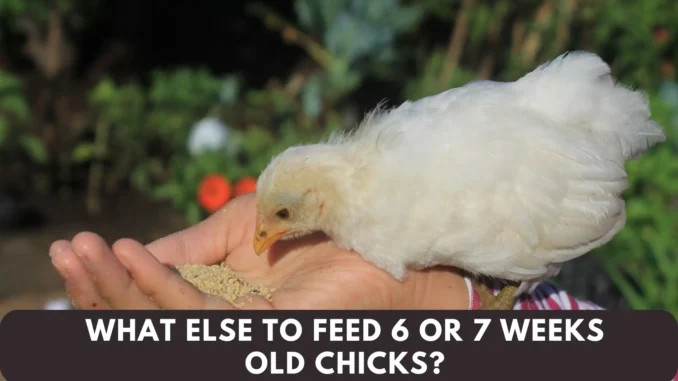
At 6 to 7 weeks, chicks are transitioning from the initial stages of their growth. This period is crucial as they begin to develop their feathers and become more independent. During these weeks, their nutritional needs change significantly.
Growth Stages of Chicks
Chicks undergo various stages of growth, and at 6-7 weeks, they enter a phase where they need more robust nutrition to support their development into pullets. Their bodies require specific nutrients to ensure they grow healthy and strong.
Nutritional Needs at 6-7 Weeks
At this age, chicks need a balanced diet rich in protein, vitamins, and minerals. It’s essential to provide them with a diet that supports their rapid growth, typically requiring around 16-20% protein.
Essential Feed Types
To ensure your chicks thrive, you need to provide them with the right types of feed.
Starter Feed vs. Grower Feed
Initially, chicks start on a starter feed that is high in protein. Once they reach about 6 weeks, you can transition them to grower feed, which still maintains adequate protein levels but is formulated to support their ongoing growth.
Protein Requirements
Protein is vital for muscle development and overall growth. Look for feeds that contain a mix of plant and animal proteins, ensuring a balanced intake.
Importance of Vitamins and Minerals
A balanced diet also includes essential vitamins and minerals like calcium and phosphorus, critical for bone development and overall health.
Supplemental Foods
In addition to commercial feed, you can introduce various supplemental foods.
Grains and Seeds
Chickens enjoy grains such as oats, barley, and corn. These can be offered in moderation as treats to promote healthy digestion.
Vegetables and Fruits
Fresh vegetables like leafy greens, carrots, and fruits such as berries can provide additional vitamins. Chop them into small pieces to make them easier for chicks to eat.
Protein Sources
Consider adding sources of protein like mealworms or scrambled eggs occasionally to their diet for an extra boost.
Water Needs
Importance of Fresh Water
Chicks need constant access to clean, fresh water. Proper hydration is crucial for their digestion and overall health.
Water Quality and Temperature
Ensure the water is at a comfortable temperature. Avoid very cold or hot water, as it can shock their systems.
Feeding Frequency and Amounts
Portion Sizes for 6-7 Week Old Chicks
At this age, chicks should be fed several times a day. A general rule is to provide food in small portions that they can consume in about 30 minutes.
Feeding Schedule
Establish a consistent feeding schedule to help maintain their routine and ensure they get the nutrients they need.
Common Mistakes to Avoid
Overfeeding and Underfeeding
Be careful not to overfeed, as this can lead to obesity and health issues. Conversely, underfeeding can stunt growth.
Neglecting Water Supply
Always check that they have enough fresh water, as dehydration can quickly lead to serious health problems.
Observing Chick Behavior
Signs of Healthy Eating
Healthy chicks are active and exhibit a strong appetite. Watch for signs of healthy eating, such as eagerly consuming their food.
When to Consult a Vet
If you notice changes in eating habits or lethargy, consult a vet to rule out any health issues.
Frequently Asked Questions (FAQs)
What should I avoid feeding chicks?
Avoid feeding them processed foods, salty items, or anything toxic to chickens, such as chocolate or avocado.
How often should I change their food?
Change their food daily to ensure freshness and prevent spoilage.
Can I feed my chicks kitchen scraps?
Be cautious with kitchen scraps. Offer only safe fruits and vegetables, avoiding anything harmful.
What if my chicks are not eating?
If your chicks refuse to eat, check for signs of illness and consider consulting a vet.
Are there special needs for certain breeds?
Some breeds may have specific dietary needs, so research your chicks’ breed for tailored care.
How to transition feeds safely?
Gradually mix the new feed with the old feed over a week to avoid digestive issues.
Conclusion
Feeding 6 or 7-week-old chicks a balanced diet is vital for their growth and health. By understanding their nutritional needs, providing proper feed types, and ensuring hydration, you can raise happy, healthy chicks ready to become productive members of your flock.
Leave a Reply